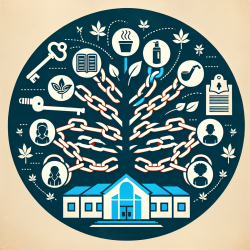Unlocking the Secret to Speech Therapy Success: Data-Driven Insights for Better Outcomes
At TinyEYE, we are committed to transforming the landscape of speech therapy for children through innovative, online solutions. Our mission is to leverage data-driven decisions to ensure the best possible outcomes for the children we serve. This blog will delve into how data can be used effectively to enhance speech therapy services and why this approach is crucial for achieving significant improvements in children's communication skills.
The Power of Data in Speech Therapy
Data-driven decision-making involves the use of data to guide and inform clinical decisions. In the context of speech therapy, this means utilizing various forms of data to tailor interventions, monitor progress, and adjust strategies as needed. Here's why this approach is so powerful:
- Personalized Interventions: By analyzing data on a child's specific needs and progress, therapists can create highly personalized intervention plans that address individual challenges more effectively.
- Progress Monitoring: Continuous data collection allows for real-time monitoring of a child's progress, making it easier to identify areas of improvement and those that need more attention.
- Evidence-Based Practices: Data provides a solid foundation for implementing evidence-based practices, ensuring that the interventions used are backed by research and proven to be effective.
How TinyEYE Utilizes Data for Better Outcomes
At TinyEYE, we integrate data-driven decision-making into every aspect of our online therapy services. Here are some of the ways we do this:
Initial Assessments
We begin with comprehensive assessments that gather detailed information about each child's communication abilities. This data forms the baseline for creating customized therapy plans.
Regular Progress Reports
Our therapists use sophisticated software to track and analyze each child's progress. These reports are regularly shared with parents and educators, ensuring everyone involved is informed and can contribute to the child's success.
Adaptive Therapy Plans
Based on the data collected, our therapists continuously adapt therapy plans to better suit the evolving needs of each child. This flexibility ensures that interventions remain effective over time.
Case Study: Success Through Data-Driven Decisions
Consider the case of a young student named Emily. Emily struggled with articulation issues that affected her ability to communicate clearly. Through our initial assessment, we identified specific sounds she had difficulty with. By collecting data on her progress during each session, we were able to adjust her therapy plan dynamically. Within six months, Emily showed significant improvement, not just in articulation but also in her confidence and social interactions.
The Future of Speech Therapy
As technology continues to advance, the role of data in speech therapy will only grow more critical. At TinyEYE, we are excited to be at the forefront of this transformation, using data to drive better outcomes for children across the globe. By continually refining our methods and leveraging the latest technological advancements, we are committed to providing the highest quality of care for every child we serve.
Conclusion
Data-driven decision-making is not just a buzzword; it's a powerful tool that can significantly enhance the effectiveness of speech therapy. At TinyEYE, we are dedicated to using data to create personalized, adaptive, and evidence-based therapy plans that yield the best possible outcomes for children. By doing so, we are not only helping children improve their communication skills but also empowering them to achieve their full potential.
To learn more about how TinyEYE can support your school with online speech therapy services, visit our website.










